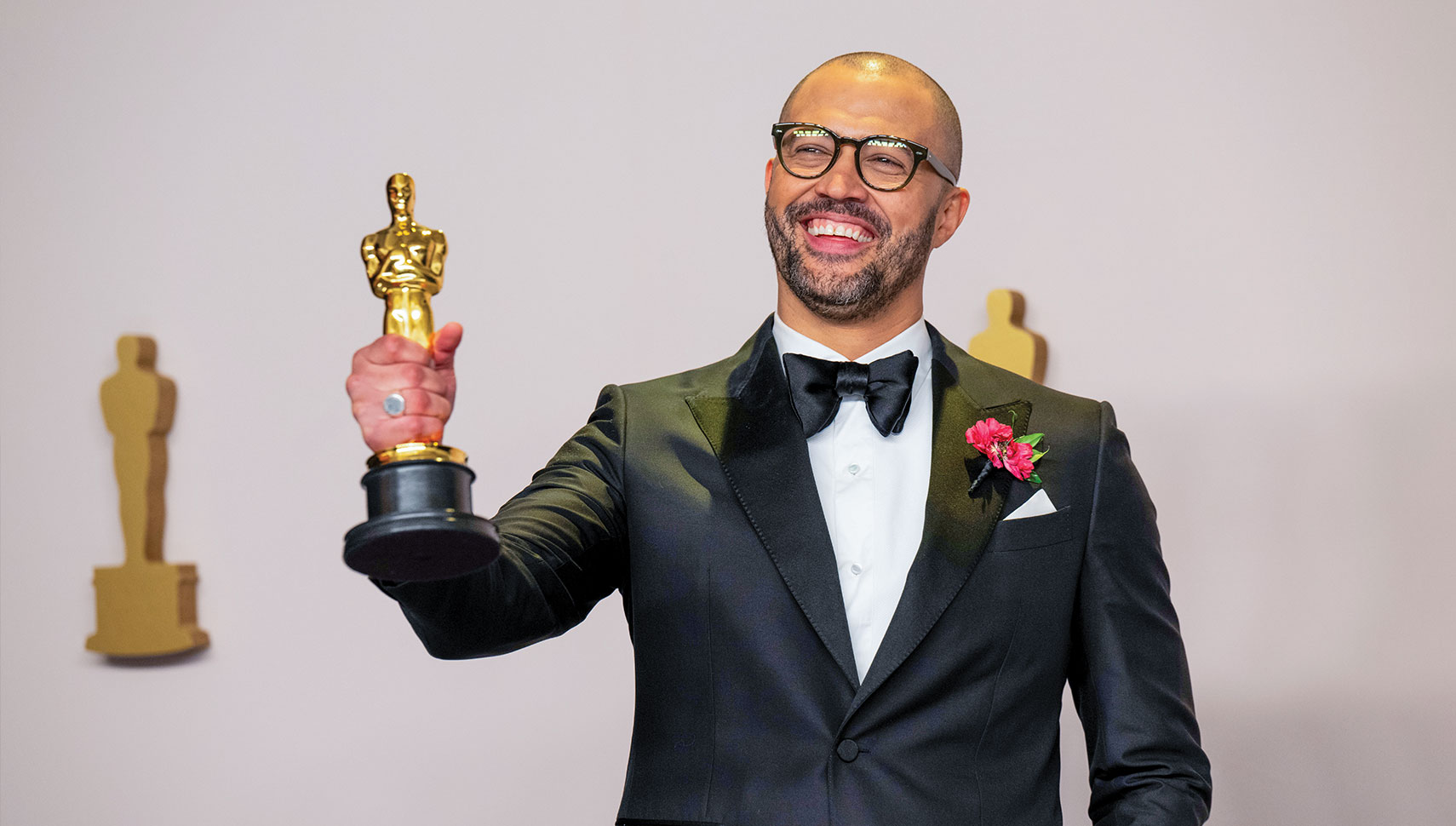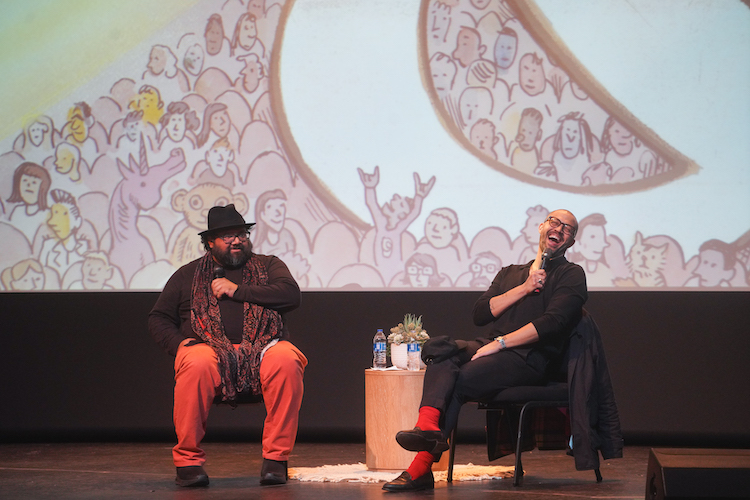Truth and 'Fiction'
Academy Award winner Cord Jefferson ’04 shares career advice during the Ampersand International Arts Festival
June 4, 2024
By
Tina Eshleman

Just two weeks after winning an Academy Award for the screenplay of his film “American Fiction,” Cord Jefferson ’04 shared key pieces of advice for those pursuing a career in the arts: Keep creating work that you’re proud of and don’t let rejection get you down.
Jefferson spoke to a full house at the Kimball Theatre in Williamsburg on March 23 as part of the Ampersand International Arts Festival, of which William & Mary is a sponsor. During a conversation moderated by fellow filmmaker Milan Chakraborty ’00, he described some of the ups and downs of his career in the entertainment industry. For example, after getting his first big break writing for the television show “Survivor’s Remorse” in 2014 and transitioning away from journalism, it took about nine months before he found his second job.
“I almost quit,” Jefferson said. “I called my manager and said, ‘I’m not independently wealthy. I can’t go for a year without working.’ By that time, I’d started eating into my savings and I had turned down other full-time journalism jobs to give this a go, and it just felt like nothing was going to happen.”

His manager advised him to give it another two months and then reassess. “About three weeks later I got an interview with Larry Wilmore, who was producing his last episode of ‘Black-ish’ at the time,” he said. Wilmore hired Jefferson to write for “The Nightly Show with Larry Wilmore,” a new series he was planning to host on Comedy Central.
Jefferson went on to write for the acclaimed TV shows “Master of None,” “The Good Place” and HBO’s “Watchmen,” for which he won an Emmy along with show creator Damon Lindelof. (Read more in the spring 2021 W&M Alumni Magazine article “Art Mirrors Life.”)
Winning an Emmy doesn’t guarantee smooth sailing, however. In October 2020 — the same year he received the award — Jefferson experienced a crushing setback when Apple TV+ shut down “Scraper,” a series he had developed based on his time previously working for the website Gawker.
“We had written the entire season,” Jefferson said. “They started telling me where I should look for my apartment in New York to be near the production offices. It was so close, then at the last minute it was, ‘No, we’re not doing this.’”
He thought that might be the end of his quest to produce his own project.
“By that point, I was pushing 40 and I thought this isn’t going to happen for me,” Jefferson said. “I’ll be able to work in writers’ rooms and that’s great. I’ll make a good living and I’ll be allowed to be creative, but I’m not going to run my own thing ever.”
A couple of months later, he discovered the novel “Erasure” by Percival Everett while looking for a book to read over the holidays. The more he read, the more he identified with the protagonist, a professor and author named Thelonious “Monk” Ellison, who is frustrated by white publishers’ expectations that Black authors should write about racial stereotypes.
“It was like, wait a minute. I’ve got two siblings. This is how my father is. My mother didn’t die of Alzheimer’s, but my mother died of cancer,” Jefferson said. “There’s a scene where one of the characters talks about how he went to William & Mary. So it just felt like there was so much in this that was speaking specifically to me and my life.”
After reading 50 pages, Jefferson started thinking he might want to adapt the script. “Within 150 pages, I started reading the character of Monk in Jeffrey Wright’s voice,” he said of the actor who eventually was cast in the role. “I started picturing Jeffrey Wright in all the scenes. I called my manager and said I think I found the first movie I want to direct.”
The resulting film, “American Fiction,” includes book covers designed by a fellow W&M graduate, Catherine Casalino ’03, who knew Jefferson when they were students and stayed in touch as they progressed in their careers.
The movie received four Oscar nominations in addition to winning the Academy Award for Best Adapted Screenplay. Jefferson also won BAFTA and Critics Choice awards for adapted screenplay and an NAACP Image Award for Outstanding Writing in a Motion Picture, and the film received two Golden Globe nominations. Made for less than $10 million, “American Fiction” so far has earned over $22 million, according to the Los Angeles Times.
During his acceptance speech at the Oscars, he urged the industry to give other new filmmakers a chance. “Instead of making one $200 million movie, try making 20 $10 million movies or 50 $4 million movies,” he said. “I felt so much joy making this movie that I want other people to experience that joy, and they are out there. I promise you.”
Still, Jefferson cautions against relying on external validation. To work in the entertainment industry, “the number one quality you need to have is resilience,” he told the Ampersand festival audience. “You are going to get told ‘no’ so much. If you’re the kind of person who doesn’t want to face rejection all the time, I would say it’s not the career for you, and that’s OK.”
Those who persevere in film and television work have to navigate a multilayered bureaucracy and they need to see value in the work they’re creating, regardless of whether they make money from it, he said.
“You write a script and then you send it to producers or executives and see if they want to fund it,” Jefferson said. “When I’m doing that, the only thing that keeps me sane is coming home and having something else to write, because whatever happens, even if every single person in the world says ‘no’ to it, I can come home and write something that’s just mine and I don’t care what other people say. The constant churn of make stuff, make stuff, make stuff — that, to me, is equally important. And the more you make, the better you’ll get.”
True to his own advice, Jefferson has other new projects in the works. He is currently writing and executive producing a limited series for Amazon Prime Video starring Scarlett Johansson based on the novel “Just Cause” by John Katzenbach.
Noting he grew up in Tucson, Arizona, Jefferson said he’s also writing a noirish, contemporary western right now, about two brothers who are tracking down a third brother they haven’t seen in six years.
Responding to a question about whether he’ll continue to work on projects in which race and racism are central themes, he said, “I’m always going to want to put Black people in my movies. But I don’t know if I want to talk so directly about race anymore. I just want to show Black people living their lives, the same as anybody else.”